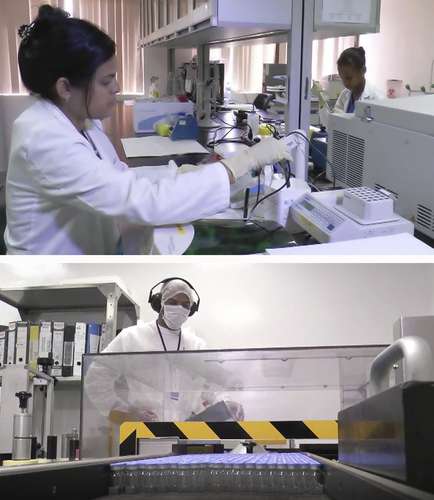Screenshots of CIM laboratories in Havana.
According to the Cuban press, CIMAvax-EGF®, a therapeutic vaccine developed in Cuba after more than two decades of research, offers hope to patients with advanced lung cancer. The vaccine has helped more than 10,000 patients on the island with this disease in secondary and tertiary health care, and it is now sweeping the American scientific community.
Cuba’s president, Miguel Dáz-Canel, emphasized the advancement of the biological system created by the Center for Molecular Immunology yesterday (CIM). The alliance between the CIM and the Roswell Park Cancer Research Center, in the United States, led to the development of the drug, despite the blockade that the United States has maintained against the island for more than 60 years, according to an article by Granma that the president shared on his Twitter account.
In order to accelerate medication development, the CIM and the Roswell Park Cancer Research Center in Buffalo, United States, teamed together a few years ago to make equipment and reagent access easier. However, this collaboration has not always been without challenges because of the economic embargo against Cuba.
The CIM is a Cuban biotechnology business that conducts research, develops drugs, produces them, and markets them to treat immune system disorders including cancer. The first facility in the US to concentrate only on cancer research is the Roswell Park Cancer Research Center, which is situated near Buffalo, New York.
In a Granma article, oncologist Elia NeningerVinageras, who has 44 years of experience, claims that the medicine has two major benefits: it has few side effects and provides a treatment for a major health issue in Cuba, such as lung cancer.
The beneficiaries can recover from severe lung cancer, according to Kalet León Monzón, deputy director of the CIM, but they may only have a very slim chance of survival in the short term.
combining different treatments
This is the only location in the United States that employs this vaccination for research reasons, according to statements made by Mary Reid, the director of Collaborative Research and an associate professor of oncology at the Roswell Park facility. She explained that in addition to the normal medications authorized for the treatment of this illness in the North American nation, a first trial for advanced lung cancer is currently being conducted. She referred to the second as having a preventive strategy because it is utilized in a group of cured patients as well as individuals who are at high risk of developing the condition in order to prevent relapse.
According to Tania Crombet, the director of clinical research at the CIM, as reported by Prensa Latina, the product is currently undergoing a study in Cuba. According to the expert, it is already utilized in primary healthcare in the Antillean territory, and the results thus far collected support the efficacy found in earlier studies. She is a doctor of science who emphasized that one of the most significant benefits is its application in primary healthcare.
This is a chance since it is not necessary for the patient to obtain the vaccine in secondary care, or a hospital. We have demonstrated that it is adequately safe and that using it in primary care ensures higher treatment compliance. the researcher added.
He continued that in the Roswell Park research, the Cuban medication is combined with an immunomodulatory treatment called Nivolumab, a monoclonal that has been shown to be safe and to improve immunogenicity, and as a result, a group of patients is seeing extremely good survival. lengthy.
Mary Reid told the media that the partnership between the Roswell Park Center and the CIM was founded on science, not on commercial or political considerations. Simply put, we were convinced from the start that CIMAvax-EGF® might help prevent lung cancer, one of the most critical health issues affecting both Cuba and the United States.
Miguel Creus, a patient who started receiving CIMAvax 15 years ago, when the illness was in phase 4 and the vaccine was in clinical trials, affirms that the medication has prolonged life in a satisfactory state of health because there are currently no signs of tumors or symptoms of the illness.
The vaccination succeeds despite the negative consequences of the White House’s economic blockade because both institutions continue to work together. Clinical trials that combine this Cuban vaccination with other effective cancer treatments are currently being researched in high-risk patients or those who are in the early stages of the disease. Tania Crombet, a researcher, cited one such trial in her article.
